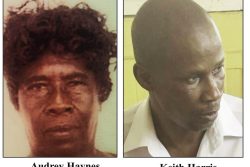 I was around 14 years old when I experienced my first raid at home by members of the state security apparatus. I still have a vivid memory of the dusty boot trails they left behind on the steps as they made their way to the upstairs of our home at around 1 am. Even saying it out loud at almost 35 years old, a small part of me still believes such a heinous intrusion and act of psychological violence was a normal part of life and how could one not.
I was around 14 years old when I experienced my first raid at home by members of the state security apparatus. I still have a vivid memory of the dusty boot trails they left behind on the steps as they made their way to the upstairs of our home at around 1 am. Even saying it out loud at almost 35 years old, a small part of me still believes such a heinous intrusion and act of psychological violence was a normal part of life and how could one not.
That was not my first observance of such violence. Years before, at around 6 or 7 years old, I had seen my dad being pulled out the yard by police and holding on for dear life to the beams. These memories, as much as you comb through them in therapy, still feel so weirdly shameful and never actually leave. Though less painful, they still influence the way we internalise violence, stigmatise others and develop both trust and distrust in each other and in the state.
Dependent on where I am and who I am around, recollections of these memories are met with different levels of empathy and fright. The aftermath for me is perhaps the scariest period of them all because not only does one get an intimate view as to how easily dignity can be stripped away, but also how one is valued by peers, friends and wider society. It leaves one feeling defeated and defenceless.
While such tools and tactics are always meant to intimidate and scare they do so much more. This week, when I heard of the raid at the family home of Melissa Atwell, popularly known as Melly MelI, I was neither surprised by the act nor the lack of condemnation.
From Ronald Waddell to Courtney Crum Ewing, years later and we seem to have learnt nothing. We have become so disconnected from the concerns of each other that not even murder can mobilise our understanding of the dangers that are ahead when a precedent has been set; or to realise when the groundwork is being laid. For whatever reason we have chosen to be quiet not only does this add to the existing trauma for the parties involved but in a plural society like ours that too is racially divisive, it further shreds the social fabric and contract. It creates unnecessary and unwarranted suspicion and it drives fear that allows for us to remain separated. Fear to speak, fear to resist and fear to associate.
Whether or not we appreciate those who make the brave attempt to hold our government accountable, we must know that attempts to silence hardly ever allow for smooth sailing and don’t guarantee the safety of anyone in the long run. Instead, they create false illusions of a sense of security and worst of all makes us numb to the feelings of our fellow countrymen as it chisels away at our humanness.
There is nothing normal about experiencing a raid at 14 years old or as a senior citizen. There is nothing normal about being in a constant state of fear for voicing your opinions in an alleged democracy. There is nothing normal about how we seem to slip further and further into the depths of selfishness when it comes being unbothered by trauma being experienced by our neighbours.







